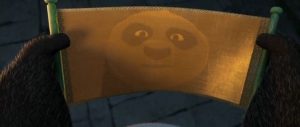by Jochen Markhorst
 “In order to survive, I recommend: be kind to each other and put on something warm.”
“In order to survive, I recommend: be kind to each other and put on something warm.”
Frank Ziegert of the Hamburg punk band Abwärts has just sketched an apocalyptic world view, human civilization has been eradicated by napalm and epidemics, Europe is a desolate crisis area (“Affentanz” on the punk classic Der Westen Ist Einsam, 1982). And then that absurd survival advice follows, so absurd that it almost has the power of a comic relief – were it not for the fact that the scenery and circumstances are too bitter and horrible.
It is a proven, age-old stylistic device to break tension or to wake up the audience, the comic relief. Usually delivered by a not too clever secondary character, such as the porter in Macbeth, Thompson and Thompson in Tintin or Olaf the Snowman in Frozen.
In poetry the space for the introduction and elaboration of a bumbling funny man is limited and the poet usually falls back on a punch line that can stand on its own, requiring only the preceding verse to gain a comical alleviation.
The German Heinrich Heine, who destroys expectations by concluding lofty, sentimental or melancholic lines with an inappropriate platitude, a dry-comic footnote or a vulgarity (the “ironic pointe”) is a grandmaster in that area. Like in “Neben mir wohnt Don Henriquez” (1824). For three couplets, the poet praises the beauty and elegance of his neighbour Don Henriquez. The women of Salamanca blush when he walks by, dogs submit. Alone at home, the silence of the summer evening inspires Henriquez’s poetic mood and dreamy he reaches for his guitar…
Quivering he touches the strings, Starting his improvising. Argh, like squalling cats his scrapings, His squeeking agonizing!
Dylan does appreciate the comic relief as well. In the early years on a transcending level, by alternating his heavier, poetic or ominous songs (“Gates Of Eden”, “A Hard Rain’s A-Gonna Fall”) with airy and light-bringing follies like “I Shall Be Free No. 10” and all those talkin’ blues songs. Later it becomes more subtle, hiding the Cheerful Note text internally. Don’t follow leaders / Watch the parking meters from “Subterranean Homesick Blues” has achieved the status of a proverb, and demonstrates, just like Abraham’s reply in “Highway 61 Revisited” (God said to Abraham, “Kill me a son” / Abe said, “Man, you must be putting me on”) Dylan’s favoured trick, the trick of his nineteenth-century colleague Heine: contrasting stately, heavy, loaded reports with banal, rude punch lines.
Similarly in “Nothing Was Delivered”. The antagonist is apparently in default, has delivered nothing, and the narrator now blames him, threatening with the unpleasant consequences that await the doubtful debtor. The three couplets are interchangeable – all three express the dismay of the I-person and all three threaten the debtor with hostage.
But then the couplet:
Nothing is better, nothing is best
Take care of your health and get plenty rest
… annihilating almost elegantly all shady gangster talk of the preceding verse. First by pretending to be a philosophical change; philosophers, scientists and artists have been fiddling around with the complex notion Nothing since the Fall of Man, and they usually entangle themselves – and the reader – in the paradox that the Nothing must be referred to as Something to be able to share something meaningful about it at all.
Nothing is better, nothing is best then is a mild, user-friendly aphorism with the wordplay of a My Name Is Nobody or a Who’s on First, but with this recital, in this song in this place, it at least suggests some depth. Agreed, it is of the same manageable complexity as Nothing in, for example, Kung Fu Panda, when the frightening villain Tai Lung has finally acquired the Dragon Scroll and opens it to learn the Great Secret that will make him the unbeatable Dragon Warrior:
 “Finally! Oh, yes. The power of the Dragon Scroll is mine!
“Finally! Oh, yes. The power of the Dragon Scroll is mine!
(unrolls the paper and finds astonished that it is an empty page)
It’s nothing!”
The hero, Panda Po, gets it – because shortly before this, his father told him what the cherished Secret Ingredient of his famous noodle soup is: also Nothing.
Po: It’s OK. I didn’t get it the first time, either.
Tai Lung: What?
Po: There is no secret ingredient. It’s just you.
It is a widely used, ancient plot, based on G.E. Lessings “Ring Parable” from Nathan der Weise (1779) and the Decamerone (around 1350) and probably the plot is even older. The punch line is always the same, just like here at Dylan. The revelation that “Nothing” is the answer first leads to an anti-climax, but then the moral gets through: it is actually a good thing, this “Nothing”; the true power comes from yourself – take care of your health and get plenty of rest. The words in the official Lyrics are from the second take, take heed of this and get plenty of rest. The most famous version, the one by The Byrds, however, follows the text of the first take, which is on that famous promotional acetate with fourteen Basement songs.
Dylan’s “Nothing Was Delivered” does not go much deeper than Kung Fu Panda, but some Dylanologists won’t have that. Authorities Oliver Trager and Robert Shelton, for example, link the song to songs like “I’m Not There”, “You Ain’t Goin’ Nowhere”,”Too Much Of Nothing”, noting how a remarkable number of Basement Songs deny, use “nothing” as an image, and try to distil thereof a kind of transcending, overarching theme. The poet Dylan thematizing “emptiness” (Trager), again expressing his need to “escape” (Marqusee), how all those denying songs are even echoes of “artists dilemmas” (Shelton).
It seems a bit thin, and the cold statistics do not really support it either. In the extremely productive year of 1967, the song maker Dylan produces an estimated hundred songs (including the lyrics of the rediscovered New Basement Tapes), and perhaps ten of them, with some good will maybe fifteen, are about denials, are praising an absence, a “Nothing” or a “Nowhere”. That comes close to a percentage that every oeuvre from every artist scores. The Beatles write in a similar span of time “Nowhere Man”, “Tomorrow Never Knows”, “For No One”, “You Won’t See Me”. Around 1913/1914 De Chirico paints dozens of masterpieces making Emptiness and Absence visible, just as Camus does in his novels, physicists, philosophers, composers, poets … everyone is at some point fascinated by Nothing. Apparently it is a universal theme, even beyond art. And just as run-of-the-mill as “Love” or “Time” or “Good and Evil”, too common anyway to see something extraordinary in it, as those respected Dylanologists would like.
Fats Domino’s influence is less debatable; all analysts agree hereon. This is not so much due to the song itself, but mainly to Richard Manuel’s piano playing in the first take (although Rolling Stone‘s Jann Wenner thinks Dylan plays the piano, but it really is a bit too good). The next two takes, and especially the last, the third (of which only 33 seconds have been preserved) put Fats’ influence in perspective; all Domino echoes have disappeared here. Most likely Dylan thought that first, superior, version being too similar to “Blueberry Hill” – after all, recording a song three times is quite exceptional in the Basement; only “Tears Of Rage” and “Open The Door, Homer” match that record.
Fortunately, Garth Hudson still had enough tape and he did not have to erase that first version. Despite the missing drums, this is by far the most attractive recording, not only thanks to Manuel’s piano playing but also due to Garth Hudson’s heart-wrenching organ playing.
“Nothing Was Delivered” is one of the fourteen songs offered to the outside world, and The Byrds are the lucky ones. They turn it into a beautiful country shuffle, from which the last bits of Fats Domino have been polished away and promote the song to album finale for their groundbreaking, but at the time somewhat undervalued, record Sweetheart Of The Rodeo (1968). By now, the album is considered as a founder of country rock, or at least as a benchmark. The opening song is also a scoop from the Basement, “You Ain’t Goin’ Nowhere”, so Dylan may be counted as at least one of the Founding Fathers of country rock.
On the occasion of the 50th anniversary of Sweetheart Of The Rodeo, in 2018, Chris Hillman and Roger McGuinn, supported by Marty Stuart & His Fabulous Superlatives, undertake an anniversary tour in which they perform the album in its entirety. For C-Notes (September 25, 2018), Hillman reflects on each song and, as usual, shows refreshingly little historical knowledge:
“I’m not sure what it’s about. I like the way Roger sings it. It has many subtexts to it. I think Bob wrote this song and You Ain’t Going Nowhere when he was laid up with a broken leg from his motorcycle accident. That’s how he came up with the songs.”
“Nothing Was Delivered” is moderately popular with colleagues, but still does invite quite a variety of versions. Howard Fishman, from the admirable Basement project Live At Joe’s Pub (2007), turns it into a cool, languid strolling, half-spoken jazz song with a beautiful, surprising cornet solo.
The Swedish blues veterans Totta & Hot’n’Tots opt for a lingering, Solomon Burke-like soul approach, but unfortunately forget the horns. The organ makes up for a lot (Featuring Spencer Bohren, 1989) and Robyn Hitchcock adheres nicely to the Byrds format, including steel guitar.
The most beautiful cover comes from Australia and is the pop gem that singer / songwriter Suzy Connolly manages to polish from it. Extremely tastefully and lovingly arranged, more Byrds-like than The Byrds have ever sounded and enriched with a captivating ebb and flow dynamics. On the tribute album Timeless Flyte – The Byrds Dylan Connection (2007).
Suzy Connolly:
What else is on the site
You’ll find an index to our latest posts arranged by themes and subjects on the home page. You can also see details of our main sections on this site at the top of this page under the picture.
The index to the 500+ Dylan compositions reviewed is now on a new page of its own. You will find it here. It contains reviews of every Dylan composition that we can find a recording of – if you know of anything we have missed please do write in.
We also have a discussion group “Untold Dylan” on Facebook. Just type the phrase “Untold Dylan” in, on your Facebook page or follow this link
And please do note The Bob Dylan Project, which lists every Dylan song in alphabetical order, and has links to licensed recordings and performances by Dylan and by other artists, is starting to link back to our reviews

We are actively promoting a link to this interesting topic on The Bob Dylan Project at:
https://thebobdylanproject.com/Song/id/458/Nothing-was-Delivered
If you are interested, we are a portal to all the great information related to this topic.
Join us inside Bob Dylan Music Box.